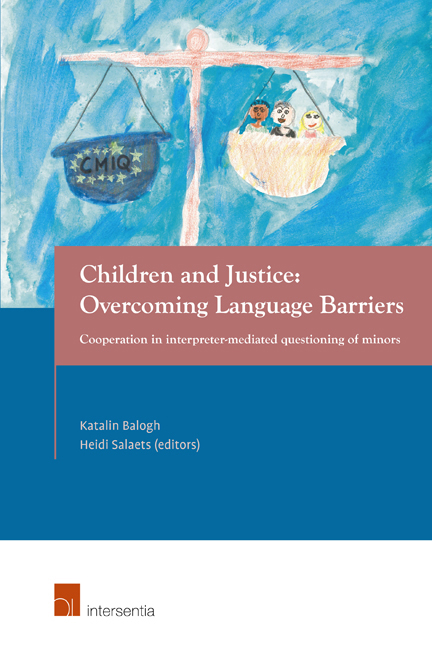 Children and Justice: Overcoming Language Barriers
Children and Justice: Overcoming Language Barriers Book contents
- Frontmatter
- Contents
- Preface
- Biographies of the authors
- Chapter 1 Introduction
- Chapter 2 Interpreted interviews with minors
- Chapter 3 Interpreted interviews with highly vulnerable children
- Chapter 4 CO-Minor-IN/QUEST research findings
- Annexes
- Annex 1 Directive 2012/29/EU
- Annex 2 CO-Minor-IN/QUEST survey (interpreters: spoken language)
- Annex 3 CO-Minor-IN/QUEST survey (interpreters: signed language)
- Annex 4 CO-Minor-IN/QUEST survey (justice and policing)
- Annex 5 CO-Minor-IN/QUEST survey (psychologists)
- Annex 6 CO-Minor-IN/QUEST survey (other professionals)
Annex 1 - Directive 2012/29/EU
from Annexes
Published online by Cambridge University Press: 22 November 2017
- Frontmatter
- Contents
- Preface
- Biographies of the authors
- Chapter 1 Introduction
- Chapter 2 Interpreted interviews with minors
- Chapter 3 Interpreted interviews with highly vulnerable children
- Chapter 4 CO-Minor-IN/QUEST research findings
- Annexes
- Annex 1 Directive 2012/29/EU
- Annex 2 CO-Minor-IN/QUEST survey (interpreters: spoken language)
- Annex 3 CO-Minor-IN/QUEST survey (interpreters: signed language)
- Annex 4 CO-Minor-IN/QUEST survey (justice and policing)
- Annex 5 CO-Minor-IN/QUEST survey (psychologists)
- Annex 6 CO-Minor-IN/QUEST survey (other professionals)
Summary
DIRECTIVE 2012/29/EU OF THE EUROPEAN PARLIAMENT AND OF THE COUNCIL of 25 October 2012
establishing minimum standards on the rights, support and protection of victims of crime, and replacing Council Framework Decision 2001/220/JHA
THE EUROPEAN PARLIAMENT AND THE COUNCIL OF THE EUROPEAN UNION,
Having regard to the Treaty on the Functioning of the European Union, and in particular Article 82(2) thereof,
Having regard to the proposal from the European Commission,
After transmission of the draft legislative act to the national parliaments,
Having regard to the opinion of the European Economic and Social Committee,
Having regard to the opinion of the Committee of the Regions,
Acting in accordance with the ordinary legislative procedure,
Whereas:
The Union has set itself the objective of maintaining and developing an area of freedom, security and justice, the cornerstone of which is the mutual recognition of judicial decisions in civil and criminal matters.
The Union is committed to the protection of, and to the establishment of minimum standards in regard to, victims of crime and the Council has adopted Framework Decision 2001/220/JHA of 15 March 2001 on the standing of victims in criminal proceedings. Under the Stockholm Programme – An open and secure Europe serving and protecting citizens, adopted by the European Council at its meeting on 10 and 11 December 2009, the Commission and the Member States were asked to examine how to improve legislation and practical support measures for the protection of victims, with particular attention paid to, support for and recognition of, all victims, including for victims of terrorism, as a priority.
Article 82(2) of the Treaty on the Functioning of the European Union (TFEU) provides for the establishment of minimum rules applicable in the Member States to facilitate mutual recognition of judgments and judicial decisions and police and judicial cooperation in criminal matters having a cross-border dimension, in particular with regard to the rights of victims of crime.
- Type
- Chapter
- Information
- Children and Justice: Overcoming Language BarriersCooperation in interpreter-mediated questioning of minors, pp. 329 - 346Publisher: IntersentiaPrint publication year: 2015
